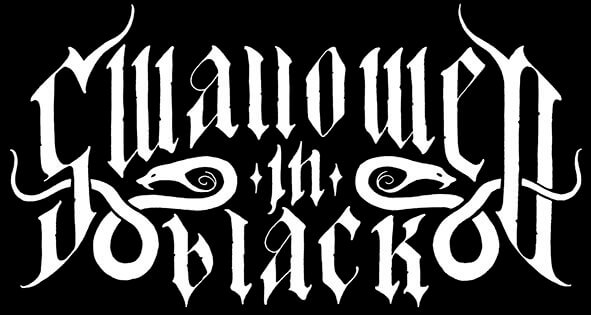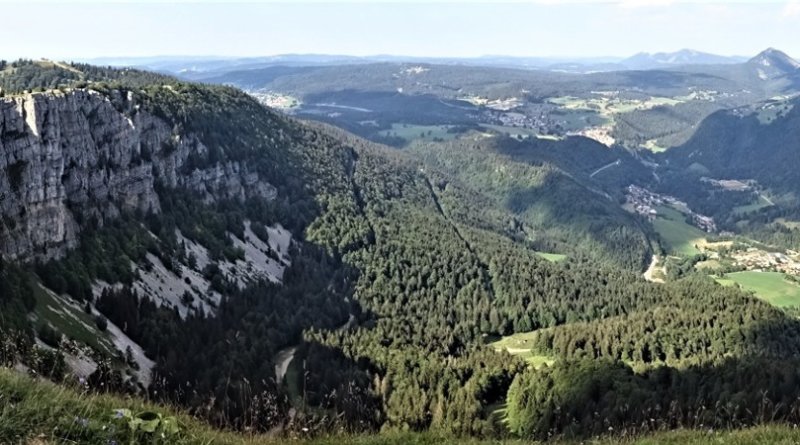“SINCE WHEN SHOULD BLACK METAL BE SMOOTH AND HARMLESS MUSIC, A ‘SAFE SPACE’ FOR WEAK PEOPLE?” – NOKTURN (AUTARCIE)
Evoking a uniquely rich cultural heritage by revisiting glorious bygone epochs from France’s illustrious history, Autarcie’s powerfully nostalgic and emotive music not only captures the original, ancient spirit of Black Metal but also serves as a poignant counterpoint to the current pitiful plight of this once-proud nation. Mirroring what’s unfolding with uncanny symmetry across the west, the France of old has seen its cultures, values and traditions diluted, dismantled, and degenerated by the relentless creep of globalisation, thus it was little surprise that Autarcie’s seventh and most-recent full-length, ‘Apogée. Ivresse. Agonie.’, would be the bleakest and most melancholic yet, irrepressible rage and regret palpable across its epic, majestic 56-minute duration. Lamenting the irreversible decline of his homeland, Nokturn curses those responsible, urging those who wish to break the shackles and reconnect with their roots to flee the cities before it’s too late.
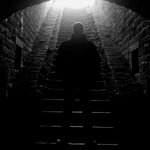 Going right back to its inception, Black Metal in its purest form has been distinguished by the communication of inherent pride in one’s native roots – an inseverable connection with the history, culture, values and traditions that define us. Respect and reverence for one’s place of birth, for blood, soil and identity, allied to a fierce resentment for anything or anybody that threatens this natural order of things. How much do these sentiments and feelings resonate with you and – alongside the actual music itself – was this one of the qualities or attributes that attracted you to Black Metal in the first place?
Going right back to its inception, Black Metal in its purest form has been distinguished by the communication of inherent pride in one’s native roots – an inseverable connection with the history, culture, values and traditions that define us. Respect and reverence for one’s place of birth, for blood, soil and identity, allied to a fierce resentment for anything or anybody that threatens this natural order of things. How much do these sentiments and feelings resonate with you and – alongside the actual music itself – was this one of the qualities or attributes that attracted you to Black Metal in the first place?
“Although it’s no longer really the case today, due to the worldwide popularisation of Black Metal, the origins of this music are deeply rooted in Western and European folklore; this is obvious. Consciously or not, this is typically a legacy of Romanticism (a cultural movement that appeared at the end of the 18th century in Germany and England, and which spread throughout Europe during all of the 19th century) and Gothic/Fantastic fiction from the 18th to 20th centuries. Occultism, dark snowy fir forests, ghostly corpsepaints, lyrical themes dealing with darkness, the devil, or Nordic folklore … these are all the ingredients that attracted me to this music when I was a teenager, about twenty years ago. Or rather, it was Black Metal that came to me, in a way. Because these elements found a familiar echo in my mind. Beyond the purely musical aspect (I was already listening to mainstream Metal at that time), it’s mostly the atmosphere and the folklore around this musical style that fitted perfectly with my state of mind. Today I still feel an attachment to this folklore, a kind of nostalgic tenderness from my teenage years. But over the years, as I got older, more serious and concrete topics took the place of these daydreams.”
Autarcie’s music celebrates France’s glorious past and laments the systematic pollution and destruction of this once-great nation in the name of progress (an inversion, if ever there was one). Your most recent album, ‘Apogée. Ivresse. Agonie.’, is a decidedly sombre and melancholic work that at times trawls the very depths of despair. Does it represent an epitaph for France? Is the battle being lost or is there still an opportunity to turn back the tide against the relentless march of modernisation, urbanisation and globalisation (not to forget the seemingly endless flood of vermin spilling onto your shores)?
“An epitaph, yes, in a way. In fact, the battle has been lost for decades. The new world order and its relentless onward march are destroying everything, in favour of a so-called ‘progress’ intended to make us slaves to a globalised elite. We are a handful of dissidents who have become aware of this fact, but overall the mass of sheep lets itself be stupidly dominated. People are drenched in daily nonsense, they are put to sleep by their monotonous daily life, they are satisfied with standardised consumerist pleasure (football, netflix, macdonald), manipulated by media and politicians, and do not seek to see beyond it. The people must wake up and rise up to put an end to this fall into the abyss. Let’s wait and see what the future holds, but honestly I don’t have much hope.”
The rage and regret pulsing through ‘France profonde’ is palpable. The following section is especially poignant and depressing: “La France que j’affectionne se meurt à petit feu, Lentement mais sûrement on la tue pour des motifs odieux, Le bon sens et la raison s’en sont enfuis au loin, De nos terroirs, de nos valeurs il ne reste plus rien.” However, there is a call to arms at the end of this song before ‘Regnum Francorum’, ‘Le bardit des hardis’ and ‘Gladio vivere, gladio morietur’ all adopt a decidedly more militant approach. Are we almost on a war footing now? Will this inevitably end in civil unrest and bloodshed?
“Disastrous political decisions, inflation and economic austerity, energy rationing, opening of borders to all migrants in the world (especially those most incompatible with our Western way of life)… All of this will end badly. If things end in bloodshed, it will not be because of the people, but because of our ‘elites’, who pushed for civil war by any means.”
Seismic events taking place on the world stage are not random; they are enacted by puppet masters hidden from view beneath the stage. From pandemics to wars to food and energy crises, the mass movement of people and climate emergencies, these ‘latest things’ are either orchestrated, facilitated or in some cases completely made up. Is the ultimate goal the global enslavement of mankind in some form of digital prison, with social (and carbon) credit scores, biometric security, digital IDs, digital cash and ultimately a universal basic income to ensure complete control of the rabble?
“Exactly, you have perfectly summarised the situation and the program from the organisers of the ‘Great Reset’. Social credit, ecological credit, energy credit, food credit… Modern slavery, regulation and domination of the people. Here’s the plan. But as long as there is ‘bread and games’ (panem et circenses) people will be happy and will accept their condition. Already on French TV, the media are calling on the population to lower the heating this winter, and encouraging people to eat insects (70% contaminated by parasites, according to scientific studies) instead of real meat, the cost of which keeps rising. Moreover, WEF scientists are currently looking into the possibility of genetically modifying humans to make them allergic to meat. It’s not a ‘conspiracy theory’, it’s simple reality. Not to mention all the intensive propaganda about welcoming migrants and promoting islamic sharia on European soil. Pure madness.”
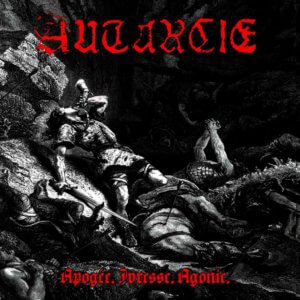 Could you explain the three existential states alluded to in the album title ‘Apogée. Ivresse. Agonie.’, which details the downfall of man and society from the great historical heights and glories of our fighting ancestors to the pitiful, trembling predicament we find ourselves in today?
Could you explain the three existential states alluded to in the album title ‘Apogée. Ivresse. Agonie.’, which details the downfall of man and society from the great historical heights and glories of our fighting ancestors to the pitiful, trembling predicament we find ourselves in today?
“This album deals with the heyday of the Frankish Kingdom (during the Merovingian and Carolingian times) and its gradual decline. Of course, there is a second meaning that draws a parallel with what we are currently experiencing in France (and even in Europe).
“The album title can be summarised as follows :
Apogée (heyday) = the pride of our historical hegemony over the past centuries.
Ivresse (drunkenness) = the recklessness and slow decline of our country.
Agonie (agony) = the civilisational end we are experiencing today.”
Does the powerful opening entreaty ‘Nation’ (chronicling the tragic descent of a powerful, sovereign, united people) encapsulate this overarching journey or fall from grace? There seems to be little or no hope evident in ‘Nation’, where you allude rather pertinently to the limited pushback and resistance (“Une infime goutte de rébellion, Diluée dans les tréfonds, D’un océan de médiocrité”)…
“Yes, as I said before, there is very little hope for the future. The damage is already done, our fate has been cast for decades. I think European decline started from the end of the Napoleonic Empire. Everything that followed, notably the two World Wars, was only an ever-deeper advance into civilisational collapse.”
The wilful acquiescence of millions of people serves only to empower their would-be oppressors. A nation is defined as ‘a large body of people united by common descent, history, culture, or language, inhabiting a particular country or territory.’ So at what point does it cease to be a nation? Maybe the definition of nation will soon be amended to fit the agenda?
“It ceases to be a nation once its leaders have decided to do so, working for decades to uproot its people, impose on them massive immigration from the Third World (in the guise of cheap labour to lower wages), abandon them to delinquency and terrorism, and oppress them on a daily basis with absurd laws. The government only punishes honest citizens and workers, not delinquents and criminals (especially when they are foreigners). Of course they change the definition of Nation so that it suits their ideology. Just as they rewrite our History every day, in order to replace it with a false one.”
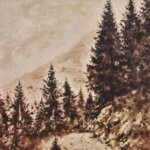 These plagues infest all of the west, which is being transformed into a third-world outpost, but if you are scratched you will no doubt bleed France . What are the innate traits or characteristics of French (and specifically that of the rich Franche-Comté region) lineage, history and geography that appeal so much to you?
These plagues infest all of the west, which is being transformed into a third-world outpost, but if you are scratched you will no doubt bleed France . What are the innate traits or characteristics of French (and specifically that of the rich Franche-Comté region) lineage, history and geography that appeal so much to you?
“Impossible for me to summarise here all the long and powerful History of France, of which each step is a fabulous epopee. From Antiquity to Medieval times, from the Renaissance to the Napoleonic Empire, France fought thousands of wars, defeated thousands of enemies, crowned thousands of kings, dominated the whole world several times. Remember that French was the official language at all royal courts in Europe from the Middle Ages, that all the great European nobility (from England to Russia) spoke French fluently, long before the tragic defeat of the Emperor Napoleon and the advent of the Anglo-Saxon world. I’m passionate and proud of this heritage, far more glorious and marvellous than the deplorable times in which we currently live. But I think that each country in Europe (and sometimes even beyond) can be proud of its History, as long as it has contributed to building a powerful civilisational model which has shone on humanity for centuries.
“Regarding my native region (Franche-Comté), I think it’s one of the most beautiful regions in France. The winter landscapes give the impression of being in the heart of Quebec’s wilderness. Its history and culture are very rich, dating back to prehistoric times. It was a high place in the Gallo-Roman era. This region experienced many wars until its annexation by the kingdom of France in the 17th century (previously it belonged to the Holy Roman Empire).This cultural heritage is one of the themes that influenced me most when I created Autarcie.”
Despite the merciless march of the modern machine, does the undulating, pregnant countryside remain unspoiled and untainted? Is this the new utopia? Are you considering retreating to the sanctity / sanctuary of rural life to flee forever urban degeneracy? Is this even practical or viable? Many dissidents are going off grid, homesteading, striving to become self-sufficient and to return to the old days. Can this be done? Or will the boot of the totalitarian, technocratic regime inevitably find all our throats?
“Nowadays it’s very difficult to break free from the influence the State has on us. You have to submit to the laws, pay taxes, submit to absurd political decisions… Nevertheless, the first piece of advice I can give is to flee the cities. Flee the cities at all costs! The bigger the city, the faster you need to leave. Let’s abandon these infamous places, they are lost territories. Let’s retreat to the countryside, sheltered as much as possible from multiculturalism and urban decay. Leave the cities to the progressists, leftists and wokists, that they end up being raped and murdered by the foreign invaders they love and defend so much. Let’s retreat and organise the resistance. Let’s organise as much as possible our autonomy, our self-sufficiency. If the world falls apart, we must be ready. I already am.”
There is a concerted attack on farmers / food producers, who are at the very heart of traditionalism, ruralism, the natural economy – and, indeed, our very way of life itself. The farmer who owns, works and defends his land symbolises freedom, strength and autonomy. Through a combination of strategically-soaring fertiliser and energy prices and the dubious lockstep drive to reduce greenhouse gas emissions (as well as the manifold other factors that affect us all), farmers are being driven out of business. Another bodyblow to independent livelihoods and a direct hit on food supplies, which could result in famine or, worse still, rationing via a credit score dependent on behaviour. And it doesn’t even bear thinking about what conventional food will be replaced by – lab-grown meat and those insects you mentioned?
“All of this is on the agenda of the elites. They want to destroy the cement of the Nation, to deprive us of any possibility of self-sufficiency and self-determinism. Attacking peasants and farmers is the best way to chain us to global agreements aimed at mass imports from all over the world; absolutely unfair competition for our breeders and farmers. All this is calculated and planned. For the elite, the national model (virtuous and healthy) must give way to an uncontrollable globalised model.”
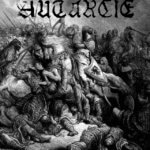 You dismissively or contemptuously mentioned football earlier – a farcical hyped-up spectator sport that is increasingly used to sedate and distract the masses. Footballers are the idols of fools. Watching others having fun and exercising is bordering on insanity. There’s no substitute for getting outside and actively participating in healthy sporting ventures. Can you tell me a little about the outdoor pursuits you engage in – the frequent hikes through teeming forests and also your lifelong passion for the ancient art of fishing?
You dismissively or contemptuously mentioned football earlier – a farcical hyped-up spectator sport that is increasingly used to sedate and distract the masses. Footballers are the idols of fools. Watching others having fun and exercising is bordering on insanity. There’s no substitute for getting outside and actively participating in healthy sporting ventures. Can you tell me a little about the outdoor pursuits you engage in – the frequent hikes through teeming forests and also your lifelong passion for the ancient art of fishing?
“Besides music and History, I have other passions, centers of interest and hobbies, like everyone. As you said, I can mention the long hikes in the forest, a bit of ‘urban exploration’ (ruined castles, abandoned military forts…), and above all I also do a lot of fishing. It’s one of my passions since childhood; my father introduced me to it. More precisely, I practise predator fishing in freshwater, with artificial lures. Mainly pike, perch, asp, chub, zander, wels catfish… Unfortunately, there is no black-bass near my location. I fish ‘no-kill’, that is to say I release most of my catches alive. I only keep some beautiful specimens of perch, zander or pike to eat (delicious). Fishing offers a real connection with nature. I spend hours in the wilderness, tracking fish while being as discreet and concentrated as possible, there’s such serenity and simplicity. I don’t practise fishing in urban environments (disgusting), only in natural and preserved places. On the other hand, I don’t practise hunting, even if I have great respect for this art.”
What are your feelings on the sorry state of Black Metal today? The general lack of strong personalities and rebellious voices in the contemporary age is rather stark. To find engaging characters with interesting or contentious viewpoints that oppose the common discourse, we almost invariably have to go back to the past, although in France you at least have many great outspoken and uncompromising voices who travel their own path with no respect for convention or fear of being ‘cancelled’ – Caverne, Peste Noire, Baise Ma Haiche, Cénotaphe…
“Since Black Metal opened up to the masses with the advent of the internet, it has exposed itself to criticism from the ignorant. In these times when everything is subject to the opinion of ‘social justice warriors’ and other ‘Thought Police’, it was obvious that Black Metal would not escape criticism from ‘well-thinking’ people. What followed was a witch hunt (as usual in History) against bands considered politically incorrect. Personally, I don’t give a damn about politics in music. Music has been plagued by leftist and far-leftist ideology for decades, why shouldn’t there be right-wing or far-right music? What supreme authority decides what is good or bad? By the way, people think antifas are there to ‘fight fascism’, when their goal is simply to impose their own far-leftist ideology, themselves using fascist and intolerant methods towards anyone they dislike. They behave far worse than those they claim to fight; they are always more extreme in their ideas and their actions. Even yesterday’s leftists are considered ‘reactionary’ by today’s leftists. Now, it’s enough for a band to simply evoke historical or patriotic topics to be accused of nazism or fascism. And people are afraid of these accusations and let themselves be intimidated. For example, when Autarcie’s latest album was released, the very popular youtube channel Black Metal Promotion uploaded it. I think the guy must have received threats and intimidation because after one week he took down his video. My label asked him why, he answered ‘because it’s a political band and I don’t promote political bands’. Idiot! Autarcie is not about politics, it’s about History! There is no indoctrination or political claim in my music. Listeners are free to think what they want. Unlike antifas, I don’t claim to educate them politically. People must be smart and strong enough to develop their own critical sense. If there is an ideology (or rather a philosophy) in Autarcie, it’s summed up by the name of the band itself: a desire for self-sufficiency and absolute distance from the surrounding social world. Thematically, Autarcie is simply an evocation of illustrious History, compared to nowadays crap. That’s all!
“So, yes, in the current Back Metal scene, we are a small handful of non-aligned bands, who don’t care about displeasing the ‘well-thinking’ people. But lumping us all together is a mistake because we all have our own way of thinking, our own goals, our own vision. Our common point is not to smooth our music to please the masses. But since when should Back Metal be smooth and harmless music, a ‘safe-space’ for weak people?”
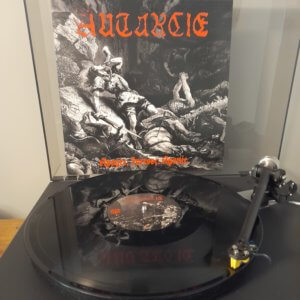 I’m perusing the fantastic gatefold jacket of the ‘Apogée. Ivresse. Agonie.’ double LP in right now. Who (re)created these wonderful battlefield images on the cover, back and inside of the sleeve; what battle do they depict; and why did you elect to use them here and now?
I’m perusing the fantastic gatefold jacket of the ‘Apogée. Ivresse. Agonie.’ double LP in right now. Who (re)created these wonderful battlefield images on the cover, back and inside of the sleeve; what battle do they depict; and why did you elect to use them here and now?
“The cover artwork of the latest album is an engraving from Alphonse de Neuville, showing the death of the famous knight Roland (Hrōþiland, in Old Frankish). At the time of Charlemagne (the great Emperor of Western Europe and King of the Franks), Roland was a warlord in charge of defending the borders of the Frankish Kingdom, who met a tragic end at the Battle of Roncesvalles. His epopee has become legendary and has been perpetuated in France for centuries.There is a great symbolism behind this character and his legend. It draws a parallel between the heroic defence of the borders of the Frankish Kingdom in Medieval times and the migratory invasion that we are experiencing nowadays. The other images that illustrate the rest of the booklet are from various artists – Gustave Doré, Luc-Olivier Merson – still on the same theme.”
With seven full-lengths and a couple of splits, Autarcie has compiled a commendable legacy of resistance during the sixteen years and counting of this inimitable entity’s existence. No trends, no hype, no compromises, no social media presence and everything communicated in your native tongue, you have always done things exclusively on your own terms. How satisfied are you with what Autarcie has delivered thus far; to what extent has it fulfilled your objectives and sated your muse; and do you have any clear picture in your mind as to what terrain you can explore in the future (both with Autarcie and other musical endeavours)?
“Overall, the results seem rather positive to me: with Autarcie I have always done what I wanted to do in my own way, without pretension. I have had the opportunity to work with valuable labels and comrades. And it seems that my music has found a certain audience. What more? Many projects are set to materialise in the coming times, but I won’t say more, no spoiler! I can only say that Autarcie will continue to release new material in the near future. For the rest, those who are interested in my activities already know how to keep updated.”
